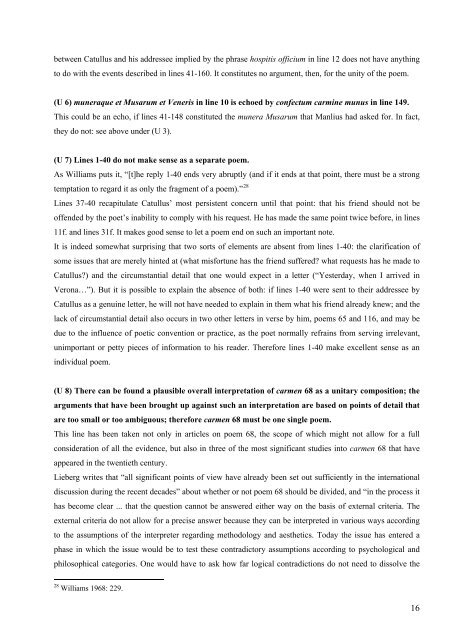CATULLUS 68 - Scuola Normale Superiore
CATULLUS 68 - Scuola Normale Superiore
CATULLUS 68 - Scuola Normale Superiore
Create successful ePaper yourself
Turn your PDF publications into a flip-book with our unique Google optimized e-Paper software.
etween Catullus and his addressee implied by the phrase hospitis officium in line 12 does not have anything<br />
to do with the events described in lines 41-160. It constitutes no argument, then, for the unity of the poem.<br />
(U 6) muneraque et Musarum et Veneris in line 10 is echoed by confectum carmine munus in line 149.<br />
This could be an echo, if lines 41-148 constituted the munera Musarum that Manlius had asked for. In fact,<br />
they do not: see above under (U 3).<br />
(U 7) Lines 1-40 do not make sense as a separate poem.<br />
As Williams puts it, “[t]he reply 1-40 ends very abruptly (and if it ends at that point, there must be a strong<br />
temptation to regard it as only the fragment of a poem).” 28<br />
Lines 37-40 recapitulate Catullus’ most persistent concern until that point: that his friend should not be<br />
offended by the poet’s inability to comply with his request. He has made the same point twice before, in lines<br />
11f. and lines 31f. It makes good sense to let a poem end on such an important note.<br />
It is indeed somewhat surprising that two sorts of elements are absent from lines 1-40: the clarification of<br />
some issues that are merely hinted at (what misfortune has the friend suffered? what requests has he made to<br />
Catullus?) and the circumstantial detail that one would expect in a letter (“Yesterday, when I arrived in<br />
Verona…”). But it is possible to explain the absence of both: if lines 1-40 were sent to their addressee by<br />
Catullus as a genuine letter, he will not have needed to explain in them what his friend already knew; and the<br />
lack of circumstantial detail also occurs in two other letters in verse by him, poems 65 and 116, and may be<br />
due to the influence of poetic convention or practice, as the poet normally refrains from serving irrelevant,<br />
unimportant or petty pieces of information to his reader. Therefore lines 1-40 make excellent sense as an<br />
individual poem.<br />
(U 8) There can be found a plausible overall interpretation of carmen <strong>68</strong> as a unitary composition; the<br />
arguments that have been brought up against such an interpretation are based on points of detail that<br />
are too small or too ambiguous; therefore carmen <strong>68</strong> must be one single poem.<br />
This line has been taken not only in articles on poem <strong>68</strong>, the scope of which might not allow for a full<br />
consideration of all the evidence, but also in three of the most significant studies into carmen <strong>68</strong> that have<br />
appeared in the twentieth century.<br />
Lieberg writes that “all significant points of view have already been set out sufficiently in the international<br />
discussion during the recent decades” about whether or not poem <strong>68</strong> should be divided, and “in the process it<br />
has become clear ... that the question cannot be answered either way on the basis of external criteria. The<br />
external criteria do not allow for a precise answer because they can be interpreted in various ways according<br />
to the assumptions of the interpreter regarding methodology and aesthetics. Today the issue has entered a<br />
phase in which the issue would be to test these contradictory assumptions according to psychological and<br />
philosophical categories. One would have to ask how far logical contradictions do not need to dissolve the<br />
28 Williams 19<strong>68</strong>: 229.<br />
16






